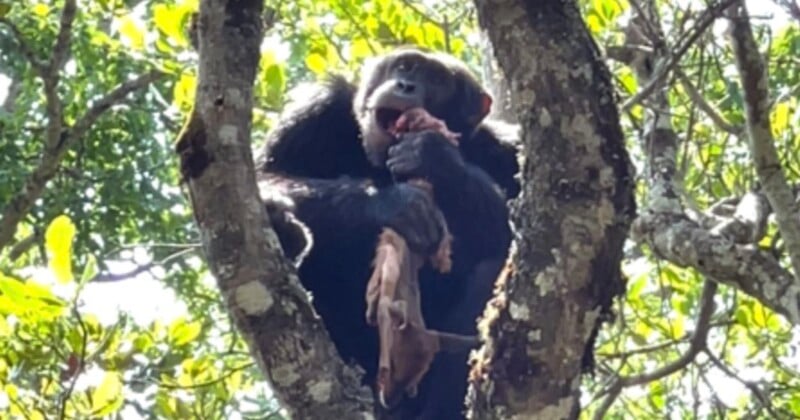Chimp is Photographed Eating Food it Stole From an Eagle

Scientists have photographed a chimpanzee stealing the dead carcass of a young antelope away from an eagle and eating its meat in an extraordinarily rare encounter.
The image may provide some insight into how early humans, who were predominantly vegetarian, began getting access to meat — a critical moment in their evolution.
According to a report by IFLScience, scientists made the unexpected observation in Issa Valley in western Tanzania.
Chimpanzees are primarily vegetarians and spend most of their time looking for fruits.
However, they are known to consume meat from animals they’ve hunted down themselves on occasion. But, scavenging like this is extremely rare.
“East African chimpanzees are endangered and this type of subsistence is very rare. Only specific populations have been observed confrontationally scavenging,” Sam Baker, lead study author and bioanthropologist and University College London, tells IFLScience.
An Unusual Observation
In a study published in Primates in October, the researchers explain how the unusual incident took place in the early afternoon of October October 24, 2021.
IFLScience reports that Baker and his field assistant were tracking a party of nine chimpanzees. However, out of nowhere, an alpha chimp named Imba ran out of the thick forest into an open patch of long grass, where a crowned eagle could be seen flying away.
The researchers then witnessed Imba with the carcass of a juvenile bushbuck — which is a species of antelope native to the area — in his mouth. While the scientists did not see the altercation directly, they believed that the eagle must have just hunted the young antelope and dropped the dead body in response to the alpha chimp’s menacing presence.
Ima then took his snatched “prize” and climbed up a tree to eat the scavenged bushbuck. However, other chimps tried to steal the carcass and begged Imba to share for around an hour.
He gave some to a female chimp and consumed most of the bushbuck himself. After discarding the carcass, other chimps then went and helped themselves to the remains. Eventually, the chimps had stripped the body until just the skull was left.
It is only the second documented example of a chimpanzee stealing food from a raptor — most accounts of scavenging of this sort involve chimps taking prey from baboons.
IFL Science notes that according to the study’s authors, past research has suggested that “confrontational scavenging provided a vital stepping stone to hominin hunting — a transition that would propel humans from ‘marginal scavengers’, reliant on the ‘leftovers’ of carnivores, to successful hunter-scavengers proficient in aggressively securing fleshed carcasses from large predators.”
Image credits: All photos via “A case of suspected chimpanzee scavenging in the Issa Valley, Tanzania” by Sam A. Baker, Fiona A. Stewart, and Alex K. Piel in Primates.